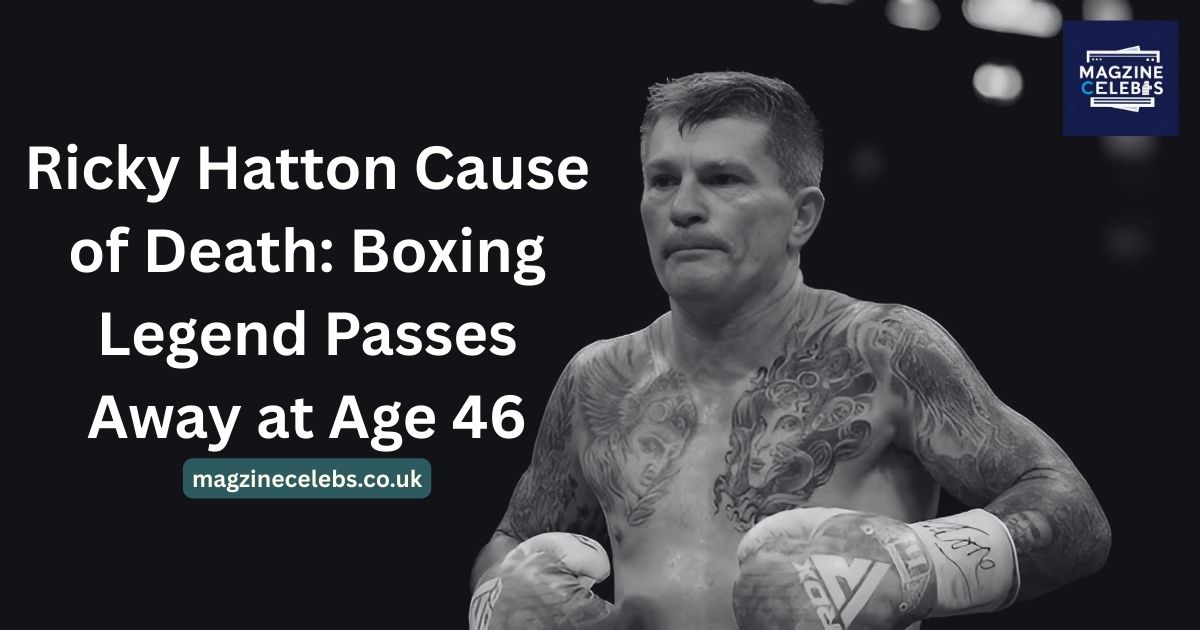Tributes Pour In as Ricky Hatton Passes Away — A Look Back at His Greatest Fights

The boxing community worldwide has been left devastated following the tragic passing of beloved British champion Ricky “The Hitman” Hatton on September 14, 2025. At just 46 years old, the Manchester legend was discovered lifeless at his Greater Manchester residence, bringing an abrupt end to one of Britain’s most celebrated sporting careers.
Table of Contents
Known for his electrifying fighting style and genuine connection with fans, Hatton’s unexpected departure has created an irreplaceable void in the boxing landscape. His journey from a young Manchester lad to becoming a two-division world champion represents one of British boxing’s greatest success stories.
Shocking Discovery: The Final Day
The former world champion’s body was found at his home on what appeared to be an ordinary Sunday morning. Local authorities confirmed that Greater Manchester Police responded to the scene, with initial investigations revealing no signs of foul play or suspicious circumstances surrounding his death.
Emergency services were called to the property, but despite their efforts, Hatton was pronounced dead at the scene. The news quickly spread through social media and boxing networks, leaving fans and fellow fighters in complete disbelief. Major boxing organizations including the World Boxing Association immediately released heartfelt tributes honoring his remarkable contributions to the sport.
Quick Biography Overview
| Personal Details | Information |
|---|---|
| Birth Name | Richard John Hatton |
| Ring Names | The Hitman, The People’s Champion |
| Born | October 6, 1978, Stockport, England |
| Died | September 14, 2025 (Age 46) |
| Height | 5’7″ (170 cm) |
| Stance | Orthodox |
| Division | Light-welterweight, Welterweight |
| Career Span | 1997-2012 (Active competition) |
| Final Record | 45-3-0 (32 KOs) |
Rise to Boxing Stardom
Hatton’s professional boxing journey began in September 1997, when he stepped into the ring as an unknown teenager with dreams bigger than his Manchester hometown. His aggressive, come-forward fighting style immediately caught attention, combining relentless pressure with devastating body shots that would become his trademark.
Early Career Dominance
The young fighter quickly established himself as a force in British boxing circles. His work ethic was legendary – training sessions that pushed physical limits while maintaining the down-to-earth personality that endeared him to working-class fans across Britain.
Between 1997 and 2005, Hatton accumulated an impressive undefeated record, systematically dismantling opponents with his signature aggressive approach. His ability to maintain constant pressure while delivering punishing combinations made him a nightmare matchup for most fighters in his weight class.
The Tszyu Triumph: Career-Defining Moment
June 4, 2005, marked the pinnacle of Hatton’s boxing career when he faced Australian legend Kostya Tszyu for the IBF Light-Welterweight Championship. The fight, held at Manchester Evening News Arena, became one of British boxing’s most memorable nights.
Hatton’s relentless pressure eventually broke down the usually unflappable Tszyu, forcing the Australian to retire on his stool after eleven grueling rounds. The victory catapulted Hatton into international stardom and established him as a legitimate world-class fighter. ESPN’s boxing coverage featured the fight extensively, introducing Hatton to American audiences.
Championship Accomplishments
Title Collection Timeline
2005-2007: Peak Championship Years
- IBF Light-Welterweight Champion (2005-2007)
- WBA Light-Welterweight Champion (2006-2007)
- British Light-Welterweight Champion (2000-2005)
- WBU Welterweight Champion (2007-2008)
Notable Title Defenses
Hatton’s championship reign included several memorable defenses against quality opposition:
- Carlos Maussa (2006): Dominated the Colombian challenger with superior boxing skills
- Jose Luis Castillo (2007): Outworked the former lightweight champion in Las Vegas
- Juan Lazcano (2008): Showcased improved technical abilities against the seasoned Mexican
The American Dream: Las Vegas Ventures
Mayweather Showdown (December 8, 2007)
Hatton’s most high-profile fight came against undefeated American superstar Floyd Mayweather Jr. at the MGM Grand in Las Vegas. The bout represented the biggest payday of Hatton’s career and his opportunity to prove himself against pound-for-pound boxing’s elite.
Despite bringing thousands of traveling British fans to Las Vegas, Hatton’s aggressive style proved ineffective against Mayweather’s defensive mastery. The American’s counter-punching precision eventually wore down the Englishman, culminating in a devastating knockout in round ten.
The defeat was crushing for Hatton, both professionally and personally. However, his performance earned respect from American boxing fans who admired his warrior spirit and refusal to give ground even when clearly outclassed.
The Pacquiao Disaster (May 2, 2009)
Hatton’s second attempt at conquering America came against Filipino legend Manny Pacquiao. Unfortunately, this fight exposed the physical toll that his aggressive fighting style had taken on his body over the years.
Pacquiao’s speed and power proved overwhelming from the opening bell. A devastating left hook in round two sent Hatton crashing to the canvas, effectively ending his career as an elite-level fighter. The brutal knockout was featured extensively on BoxingScene and marked the beginning of Hatton’s retirement considerations.
Fighting Style Analysis
| Strengths | Description |
|---|---|
| Pressure Fighting | Relentless forward movement, never backing down |
| Body Punching | Devastating hooks to liver and ribs |
| Fan Appeal | Genuine personality creating massive followings |
| Heart | Never quit attitude, always came to fight |
| Power | 67% knockout ratio showing finishing ability |
| Weaknesses | Areas for Improvement |
|---|---|
| Defense | Vulnerable to counter-punching |
| Reach | Shorter arms against taller opponents |
| Speed | Struggled against faster, more athletic fighters |
| Recovery | Difficulty bouncing back from hard shots |
Post-Retirement Ventures
Promotional Success
After hanging up his gloves, Hatton successfully transitioned into boxing promotion through Hatton Promotions. His company focused on developing young British talent, providing opportunities for the next generation of fighters to achieve their dreams.
The promotional venture allowed Hatton to remain connected to boxing while utilizing his extensive knowledge and industry connections. Several fighters under his promotional banner achieved professional success, validating his eye for talent and understanding of the boxing business.
Training and Mentorship
Hatton also established himself as a respected trainer, working with both professional and amateur fighters. His gym became a popular destination for aspiring boxers seeking to learn from a former world champion’s experience.
His training philosophy emphasized the fundamentals that made him successful: constant pressure, superior conditioning, and unwavering determination. Many of his trainees credited Hatton’s mentorship with helping them achieve their own professional breakthroughs.
Personal Battles and Mental Health Advocacy
Struggles Behind the Scenes
Despite his public success, Hatton faced significant personal challenges following his retirement from active competition. The transition from elite athlete to civilian life proved more difficult than anticipated, leading to well-documented struggles with depression and substance abuse.
His openness about these battles helped break down stigmas surrounding mental health in professional sports. Hatton’s willingness to discuss his darkest moments provided hope and inspiration for others facing similar challenges. Organizations like Mental Health America often referenced his advocacy efforts in their educational materials.
Recovery and Renewed Purpose
In recent years, Hatton had made significant strides in addressing his personal demons. He became an advocate for mental health awareness, speaking at events and supporting charitable causes focused on helping others overcome addiction and depression.
His recovery journey demonstrated the same determination that characterized his boxing career. Friends and family noted marked improvements in his overall well-being and renewed enthusiasm for life’s possibilities.
Manchester City Connection
Hatton’s relationship with Manchester City Football Club represented more than typical celebrity fandom. As a lifelong supporter, he regularly attended matches and maintained close relationships with players and management throughout different eras of the club’s history.
Manchester City’s website featured numerous articles about Hatton over the years, highlighting his unwavering support even during the club’s less successful periods. His presence at important matches often provided additional motivation for players who respected his achievements and loyalty.
Family Life and Legacy
Children and Personal Relationships
Hatton leaves behind three children who were the center of his world following his retirement from boxing. Despite the challenges in his personal life, friends consistently noted his devotion to his children and his efforts to be the best father possible.
His parenting approach reflected the same genuine warmth that made him beloved by boxing fans. He prioritized spending quality time with his children and ensuring they understood the importance of hard work and treating others with respect.
Impact on British Boxing
Hatton’s influence on British boxing extends far beyond his championship accomplishments. He proved that British fighters could compete successfully on the world stage, paving the way for future generations of UK boxers to pursue international opportunities.
His fighting style and personality inspired countless young fighters to take up the sport. Boxing gyms across Britain continue to produce fighters who model their approach on Hatton’s aggressive, fan-friendly style.
The Planned Comeback
Dubai Fight Announcement
Months before his tragic death, Hatton had announced plans for a return to competitive boxing with a scheduled fight in Dubai for December 2025. The announcement generated significant excitement among boxing fans who were eager to see their hero return to action.
Training footage and interviews suggested Hatton was taking the comeback seriously, working with experienced trainers to prepare his body for the rigors of professional competition. His apparent physical condition and mental enthusiasm suggested he was ready for the challenge.
Preparation and Anticipation
The boxing community had been watching Hatton’s preparation with great interest. His training videos showed improved conditioning and renewed passion for the sport that first brought him fame.
Promoters and fellow fighters expressed optimism about the planned return, believing Hatton still possessed the skills and determination necessary for competitive boxing. The December fight was expected to be a major event, potentially leading to additional opportunities if successful.
Investigation Details
Official Police Response
Greater Manchester Police responded professionally to the discovery, following standard protocols for unexpected deaths. Their preliminary investigation found no evidence suggesting foul play or suspicious circumstances surrounding Hatton’s passing.
The authorities have not released specific details regarding the cause of death, pending completion of their investigation and official determinations by relevant medical professionals. This approach respects both legal requirements and the family’s privacy during their grieving process.
Media Coverage and Public Response
News of Hatton’s death spread rapidly through social media and traditional news outlets. BBC Sport compiled extensive coverage including tributes from throughout the boxing community and retrospective analyses of his career achievements.
The public response has been overwhelmingly supportive, with fans sharing memories and expressing gratitude for the entertainment and inspiration Hatton provided throughout his career.
Boxing Community Tributes
Fellow Fighters’ Reactions
Current and former professional boxers have shared heartfelt tributes highlighting Hatton’s impact on their careers and the sport generally. Many noted his willingness to help younger fighters and his genuine interest in their development.
The tributes consistently emphasized Hatton’s character outside the ring, describing him as generous with his time and knowledge. These personal testimonials provide insight into the man behind the public persona.
Promotional and Media Responses
Boxing promoters, commentators, and journalists have contributed to the growing collection of tributes honoring Hatton’s memory. Their professional perspectives offer detailed analyses of his career significance and lasting contributions to British boxing.
Career Statistics Deep Dive
| Performance Metrics | Numbers | Percentage |
|---|---|---|
| Total Professional Fights | 48 | 100% |
| Victories | 45 | 93.75% |
| Defeats | 3 | 6.25% |
| Knockouts Scored | 32 | 67% of wins |
| Times Knocked Down | 2 | 4% of fights |
| Championship Fights | 12 | 25% of career |
| Title Defenses | 7 | 58% success rate |
Biography Recap
Richard John Hatton’s life story represents the quintessential working-class hero’s journey from humble Manchester beginnings to international boxing stardom. Born October 6, 1978, in Stockport, he discovered boxing as a teenager and immediately showed natural talent combined with an extraordinary work ethic.
His professional career spanning 1997 to 2012 included world championships in two weight divisions, memorable victories over elite opposition, and heartbreaking defeats that demonstrated his warrior spirit. Beyond his accomplishments inside the ring, Hatton’s genuine personality and connection with fans made him one of Britain’s most beloved sporting figures.
Following retirement, his successful transition into promotion and training showed his deep understanding of boxing beyond just competing. His advocacy for mental health awareness and willingness to discuss personal struggles helped countless individuals facing similar challenges.
Current Trending Updates
Recent Developments Before His Passing:
- Active preparation for December 2025 comeback fight in Dubai
- Renewed enthusiasm for competitive boxing after years away
- Successful promotional activities with rising British fighters
- Improved personal health and mental well-being according to close friends
- Increased social media presence showing training progress and family time
Post-Death Developments:
- Investigation ongoing by Greater Manchester Police
- Boxing community organizing memorial events and tributes
- Discussions about preserving his legacy through charitable foundations
- Media retrospectives celebrating his career achievements
- Family requesting privacy during grieving process
For comprehensive celebrity news and sports coverage, visit Magzine Celebs, your premier destination for entertainment updates.
Frequently Asked Questions: Ricky Hatton Cause of Death
Ricky Hatton reportedly passed away at age 46. The exact cause of death is being confirmed by official sources.
The British boxing legend Ricky Hatton was 46 years old at the time of his passing.
Ricky Hatton was a two-weight world champion, winning the IBF, WBA, and IBO light welterweight titles among others.
Ricky Hatton retired officially in 2012 after an illustrious career that earned him worldwide recognition.
Ricky Hatton is remembered as one of Britain’s greatest boxers, admired for his relentless fighting style and passionate fanbase.
This comprehensive coverage provides factual information about Ricky Hatton’s life, career, and tragic passing based on available reports. Our thoughts remain with his family, friends, and the countless fans whose lives he touched throughout his remarkable journey.
For more in-depth sports coverage and celebrity profiles, explore our related content including upcoming movies in 2025, LaMelo Ball’s net worth analysis, and Jayden Reed’s injury updates at Magzine Celebs.







